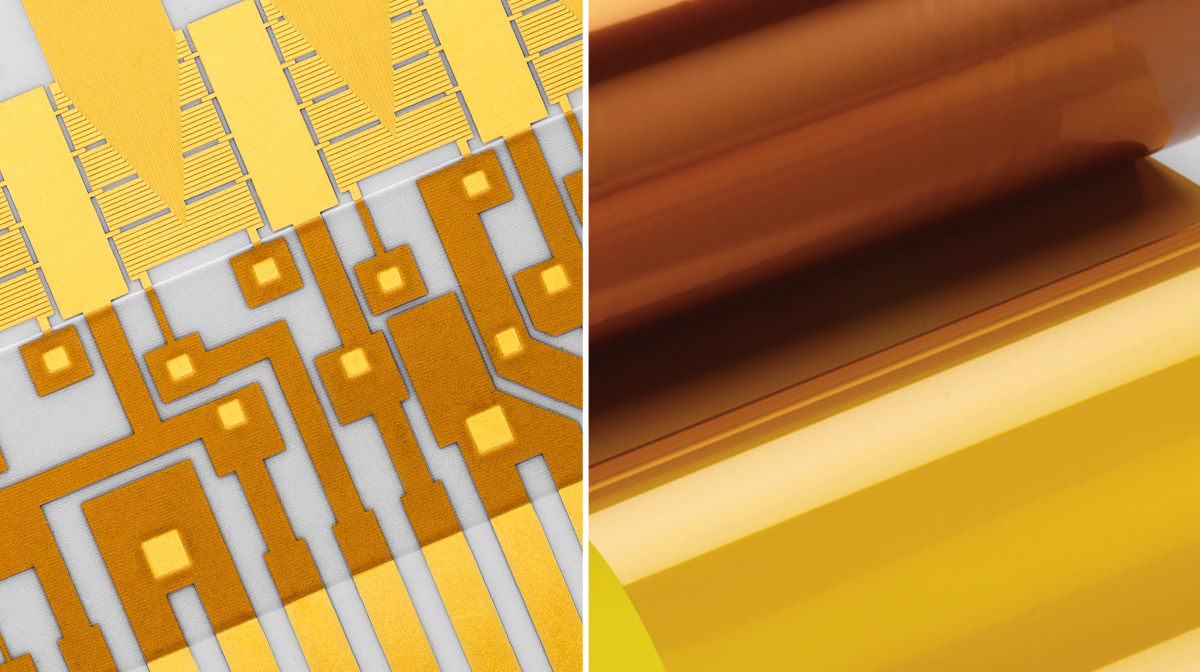
Why Thin Film Instead of Kapton® for your Flexible Microcircuits?
The ultimate factor in deciding when not to use the Kapton polyimide film manufacturing method is a combination of desired size and flexibility. Basically, the moment you’re uttering “micron” as opposed to “mils”, best to start thinking about thin film.
Conventional flex circuit manufacturing often starts with rolls of Kapton — a Dupont™ polyimide film pre-clad with a metal layer. It works well for circuits with layers starting around 25µ-127µ. But for microcircuits, where layers get thinner, spaces and traces get tighter, and tolerances are measured in microns, there’s only one manufacturing choice —thin film.
Ultra-small, or sub-micron flexible circuits, often used in things like medical sensors, have to meet certain design and performance criteria that macro scale flex circuits simply don’t. Consider, for example, how small and flexible a circuit must be if it’s going to wrap inside a catheter tube. Today, We are making ultra-miniature flex circuits consisting of up to six layers, each as thin as 10 microns, with trace lines and spaces as small as three microns, and via diameters as small as 25 microns. Contrast that with more typical flex circuits whose layers might be a half- or one-millimeter thick and with trace lines and spaces measured in tenths of millimeters.
Circuit features must, of course, be very small if they’re going to fit inside a very small space. They also must be very thin if they’re going to be both small and flexible. But traditional flex circuits, which employ Kapton film cut from rolls — 25µ to 127µ thick or more — can’t be made at ultra-small scale. The reason is Kapton film consists of a polyimide layer joined to a metal layer by an adhesive and then circuit traces and spaces are created by removing unwanted metal by chemical etching or laser ablation and mechanical punching then creates vias and through holes. Not only does the Kapton’s starting thickness inhibit flexibility at small scale, it also imposes limits on the feature dimensions themselves. The thicker the layers, the wider the trace lines, spaces, and vias have to be.
Taking a Thin Film Approach to Ultra-miniature Flex Circuits
Contrary to the removal process employed when beginning with Kapton®, our microcircuits employ a thin film sputtering, or deposition process in conjunction with a liquid polyimide base on glass.
This process is the only way the smallest, thinnest and most flexible circuits can be made. It starts with the base polyimide layer. Then we sputter a very thin metal layer (seed layer) directly on the polyimide (no adhesive required). We then cover the seed layer with a photo-resist, image the circuit line pattern onto it, and then deposit additional metal onto the exposed trace lines so as to build up the circuit lines to the required thickness. (The thicker the lines the more current they can handle.) To add another circuit layer, we repeat the process — sputtering a second metal seed layer on top of a polyimide insulation layer that covers the first circuit layer to begin again. Once a circuit is fully processed, it is easily removed from the glass with water.
By contrast, to add multiple circuit layers using the Kapton film method, the individual circuit layers have to be built separately and then bonded together with adhesive in a heated vacuum press.
Because our thin film circuit process employs a direct metal-to-metal bond, without adhesive, the bonds are stronger and circuit purity is higher—a key consideration in many microcircuit applications, especially medical device implants, and sensitive radio electronics.
So the ultimate factor in deciding when not to use the Kapton polyimide film manufacturing method is a combination of desired size and flexibility. Basically, the moment you’re uttering “micron” as opposed to “mils”, best to start thinking about thin film.

